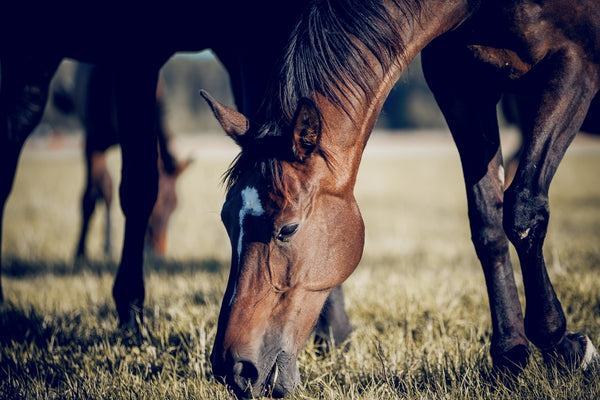Decoding Horse Feed: A Guide to Understanding Ingredient Labels and Choosing the Best Nutrition for Your Equine Companion
As self-proclaimed "horse people," we understand the importance of providing our equine companions with the best nutrition possible. However, navigating the world of horse feed can be overwhelming, especially when faced with dozens of name brands, WAY too many ingredients, and confusing jargon. We'll delve into deciphering ingredient labels, highlighting ingredients to avoid, and exploring the most holistic diet for horses, ensuring your equine partners receive the nutrients they need for optimal health and performance.
Before delving into the specifics of horse feed ingredients, it's crucial to understand how to read and interpret ingredient labels accurately. The first step is to familiarize yourself with the order of ingredients listed on the label. Ingredients are typically listed in descending order by weight, with the most prominent ingredient listed first. Pay close attention to the first few ingredients, as they constitute the majority of the feed's composition. Look for recognizable, whole-food ingredients rather than vague or unfamiliar additives. As a good reminder, steer clear of feeds that share ingredients with jet fuel.
Additionally, be wary of marketing tactics such as flashy claims or buzzwords like "all-natural" or "premium." Instead, focus on the actual ingredients listed and their nutritional value. If you're unsure about a particular ingredient, don't hesitate to research its purpose and potential effects on equine health.
Ingredients to Stay Away From in Horse Feed:
Not all ingredients are created equal; some may even be harmful or unnecessary for your horse's well-being. Here are a few key ingredients to steer clear of when selecting horse feed:
a. Added Sugars: Ingredients such as molasses or corn syrup may be added to enhance palatability but can contribute to weight gain, insulin resistance, and metabolic disorders in horses.
b. Artificial Preservatives and Colors: Chemical preservatives and artificial colors have no nutritional value and may pose health risks to horses, including allergic reactions and digestive disturbances.
c. High Levels of Starch and Grain By-Products: Excessive amounts of starch and grain by-products can disrupt the horse's digestive system, leading to issues such as colic, laminitis, and insulin resistance. Opt for feeds with lower starch content and focus on forage-first alternatives.
d. Fillers and Binders: Ingredients like soy hulls or wheat middlings serve as inexpensive fillers but offer little nutritional benefit and may contribute to digestive issues.
The Most Natural Diet for Horses and the Micronutrients They Need:
While commercial horse feeds can provide essential nutrients, mimicking a horse's natural diet is often the healthiest option. Horses are herbivores designed to graze on forages such as grasses and hay, which provide essential fiber, vitamins, and minerals. Incorporating high-quality forage into your horse's diet should be the foundation of their nutrition. Work with your vet to find out if there are certain micronutrients that your horse needs added to their diet.
In addition to forage, horses require specific macronutrients & micronutrients to thrive, including:
a. Protein: Essential for muscle development, tissue repair, and overall growth. Good sources of protein include alfalfa and high-quality grasses. These are made up of smaller building blocks called amino acids. Horses
b. Vitamins and Minerals: Key vitamins such as vitamin A, vitamin E, and B vitamins are essential for various bodily functions, while minerals like calcium, phosphorus, and magnesium are vital for bone health, muscle function, and overall well-being.
c. Essential Fatty Acids: Omega-3 and omega-6 fatty acids play crucial roles in immune function, skin health, inflammatory response, and cellular regeneration. Sources include flaxseed, chia seeds, and hemp protein.
Understanding how to read ingredient labels in horse feed empowers us "horse people" to make informed choices about our horse's nutrition. By avoiding harmful additives and prioritizing whole-food ingredients, you can provide your equine companion with a diet that supports their health and vitality. Remember to focus on natural, forage-based nutrition and ensure they receive essential micronutrients for optimal well-being. With a little knowledge and careful selection, you can nourish your horse from the inside out, promoting longevity and performance for years to come.
